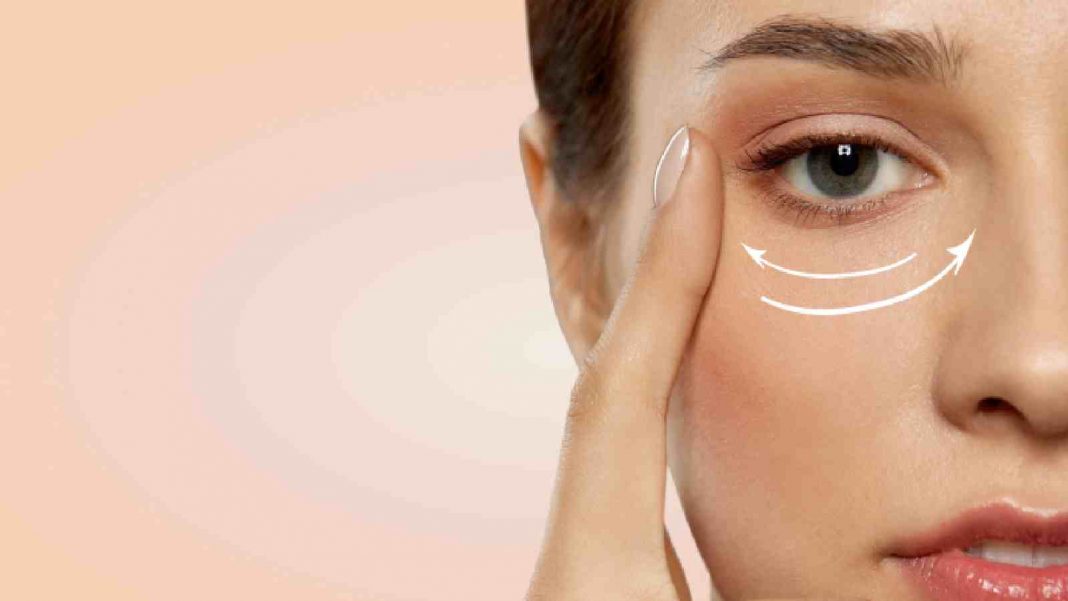We all have a skin care routine. Some might include more products in their skin care regime and others might just stick to three or four products. If skin is dry, we look for moisturizing products. If it’s oily, we look for ways to deal with it. But sometimes we forget to check the ingredients in the products and use them generously. One of the parts of your face that can be greatly affected by this is the under-eye area. There are some ingredients in skin care products that should never be applied under your eyes.
Health Shots connected with Mumbai-based cosmetologist Dr Monica Kapoor to know which all ingredients should be avoided in the under-eye area.

Why is the under-eye area sensitive?
The under-eye area is typically more delicate and sensitive than other parts of the face, says Dr Kapoor. That’s because the skin in this area is thinner, and there are fewer oil glands to moisturize and protect it. Also, the muscles around the eyes are constantly moving, which can lead to wrinkles and fine lines over time. Then there are environmental factors such as sun exposure, pollution and stress that can all exacerbate these issues.
Skin care ingredients you must not apply under your eyes
As the skin around the eyes is thinner and more sensitive than the rest of the face, it can be easily irritated by certain ingredients. Here are some of the things that are a no-no for the under-eye area.
1. Retinoids
The anti-aging ingredient is commonly found in products that promise to tackle fine lines and wrinkles. But at times, they can be very irritating to the skin, especially the delicate skin around the eyes. Using retinoids in the under-eye area may cause redness, dryness, and flakiness, says the expert.
2. Salicylic acid
Salicylic acid is a popular acne-fighting ingredient that works by exfoliating the skin and unclogging pores. However, it can be too harsh for the sensitive under eye area and may cause irritation and make your skin dry.
3. Hydrogen peroxide
Hydrogen peroxide is a strong oxidizing agent that is often used to lighten hair or disinfect wounds. However, it can be too harsh for the delicate skin around the eyes and may cause redness, stinging, and irritation.
4. Fragrance
We all love sweet smelling products. Fragrance happens to be a common ingredient in skin care and cosmetics. But it can be irritating to sensitive skin. The under eye area is particularly vulnerable to irritation from fragrances, which can cause stinging, itching, and redness.
5. Essential oils
Essential oils are often used in skin care for their therapeutic properties, but they can be too harsh for the delicate under eye area. Some essential oils, such as peppermint and eucalyptus, can cause stinging and irritation, while others such as lemon and lime, can cause photosensitivity and increase the risk of sun damage
6. Cinnamon
Cinnamon is a spice that some like to go for to have acne-free skin. However, it can be too irritating and cause a burning sensation when applied to the sensitive under-eye skin. So, it’s best to avoid products containing cinnamon or cinnamon extracts in this area, says Dr Kapoor.
7. Alcohol
Alcohol-based skincare products, such as toners or astringents, can be really drying and irritating for the under-eye area. Alcohol strips away the skin’s natural oils and moisture, which can lead to dryness and increased sensitivity.
8. Strong exfoliants
Harsh exfoliants like walnut shells or large sugar granules can be too abrasive for the under-eye area. Using such exfoliants in this area can lead to micro-tears, redness, or even damage to the skin barrier.

Tips to take care of under-eye area
It is important to avoid using harsh or irritating ingredients in this part of your face. Stick to gentle, hydrating ingredients like hyaluronic acid and ceramides, and always patch test new products before applying them to the under-eye area, suggests the expert. Here’s what you can do for your under-eye area:
• Go for a gentle cleanser so that your skin’s natural oils remain intact.
• Moisturize with a lightweight, non-greasy formula that is specifically designed for the under-eye area.
• Use a daily sunscreen to protect the delicate skin from UV rays.
• Get enough sleep to prevent dark circles and puffiness.
• Avoid rubbing or pulling at the skin around the eyes, as this can cause wrinkles and fine lines.
• Use a cool compress or eye mask to soothe puffiness and inflammation.
The fact is that everyone’s skin is unique, and some women may have different tolerances to certain ingredients. If you’re unsure about a specific ingredient or product, it’s always best to consult with a dermatologist.







